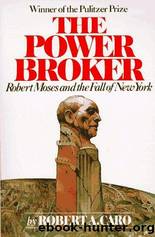The Power Broker: Robert Moses and the Fall of New York by Caro Robert A

Author:Caro, Robert A. [Caro, Robert A.]
Language: eng
Format: epub
Tags: 1888-1981, Politics, Business, Biography, History, Robert, Moses
ISBN: 9780394720241
Amazon: 0394720245
Goodreads: 1111
Publisher: Vintage Books
Published: 1974-09-16T07:00:00+00:00
Other reformers would later describe their overriding emotion at Moses' philosophy and tactics as "shock."
They had no justification for such an emotion. There was nothing new about that philosophy or those tactics. The insistence that his proposals be viewed only in isolation, that each be viewed strictly as an attempt to solve a particular, limited problem by creating a particular structure of concrete and steel, that it not be evaluated in terms of the needs of the city as a whole (the need for a bridge, for example, weighed against the need for schools and hospitals) or even as part of the larger problem of which the specific problem was only a part (a traffic-moving machine like a bridge evaluated in terms of the city's over-all traffic-moving problem) and especially not in terms of its impact on the surrounding neighborhoodâwas the same insistence that had underlain the public works he had been building in their city for five years. Moses had used these same arguments in arguing for a dozen other projectsâmost of which the reformers had enthusiastically supported. If they had ever taken a close look at those projects, had ever examined them with the same care with which they examined the Brooklyn-Battery Bridge, they would have seen that this philosophy lay behind them. They were shocked now only because they had never bothered to take such a look.
As for the vicious personal attacks, Moses had been making vicious personal attacks for years. The only difference was that this time the target was them âand they therefore saw how unfair the attacks were. Previously they had laughed indulgently at Moses' propensity for personal vituperation, regarding it as a harmless idiosyncrasy; perhaps, when one took into account all the crooked politicians, hack bureaucrats and selfish private individuals with whom Moses had to deal, even admirable. In that laughter and that indulgence was a feeling that Moses' methods, however distasteful, however antithetical to their principles, were justified by the difficulties he had to surmount to Get Things Done.
But in the Battery Crossing fight, the reformers could not avoid taking a good look at one of Robert Moses' controversiesâand at Robert Moses. They could no longer avoid seeing precisely what kind of man they had for so long believed in. The Battery Crossing fight was the moment of truth in their relationship with Moses. After supporting him for years in a score of battles, after sacrificing, over and over again, the principles so dear to them in his support, after helping to raise him to power and helping to keep him in power, they saw him at last for what he wasâand they realized that he was not the embodiment of everything they believed in but its antithesis. If, for the twenty years before the fight, the Good Government organizations of New York City had supported him, for the twenty years after the fight, those organizations would oppose him.
The Battery Crossing fight was also the'moment of truth for the reformers in another respect.
Download
This site does not store any files on its server. We only index and link to content provided by other sites. Please contact the content providers to delete copyright contents if any and email us, we'll remove relevant links or contents immediately.
The Secret History by Donna Tartt(19086)
The Social Justice Warrior Handbook by Lisa De Pasquale(12190)
Thirteen Reasons Why by Jay Asher(8909)
This Is How You Lose Her by Junot Diaz(6886)
Weapons of Math Destruction by Cathy O'Neil(6279)
Zero to One by Peter Thiel(5801)
Beartown by Fredrik Backman(5754)
The Myth of the Strong Leader by Archie Brown(5507)
The Fire Next Time by James Baldwin(5442)
How Democracies Die by Steven Levitsky & Daniel Ziblatt(5218)
Promise Me, Dad by Joe Biden(5153)
Stone's Rules by Roger Stone(5087)
A Higher Loyalty: Truth, Lies, and Leadership by James Comey(4962)
100 Deadly Skills by Clint Emerson(4925)
Rise and Kill First by Ronen Bergman(4788)
Secrecy World by Jake Bernstein(4753)
The David Icke Guide to the Global Conspiracy (and how to end it) by David Icke(4717)
The Farm by Tom Rob Smith(4507)
The Doomsday Machine by Daniel Ellsberg(4490)
